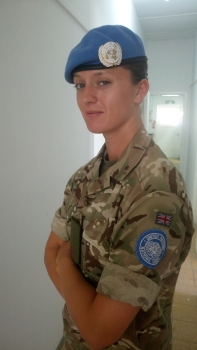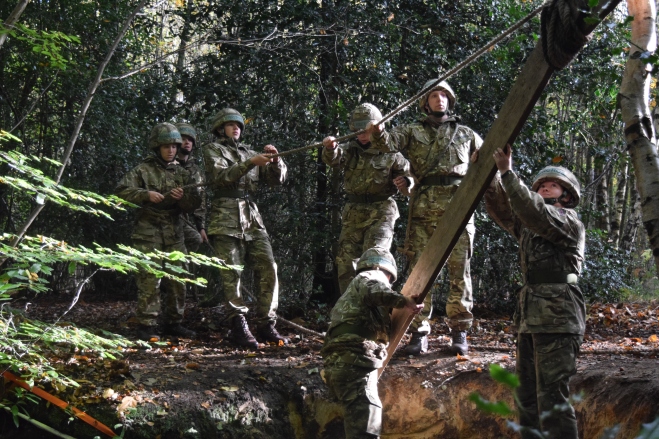 Army Reservist Private Belinda Houghton (25) from Blackpool is an Army medic currently serving with the 4th Battalion The Duke of Lancaster’s Regiment as part of the United Nations Forces in Cyprus (UNFICYP) mission.
Army Reservist Private Belinda Houghton (25) from Blackpool is an Army medic currently serving with the 4th Battalion The Duke of Lancaster’s Regiment as part of the United Nations Forces in Cyprus (UNFICYP) mission.
Christmas is fast approaching here at the United Nations Protected Area in Cyprus. Spontaneous outbreaks of Christmas sing-a-longs and jingles that beckon you to join in as you walk or drive along, or to buy something pretty, expensive and completely outrageous, but that is Christmas these days isn’t it?
At work, the endless resourcefulness of the British Army soldier is pushed to its limits with decorating our work and living spaces with trees, tinsel, lights and angels. Santa could never miss us even if he tried and thanks to the good work of the Royal Air Force and the military logistics personnel that move so many parcels at this time of year, on Santa’s behalf, we are filling the empty spaces under the Christmas tree and in our rooms amazingly fast. With the sun still shining brightly outside but with a little frost, my body tells me it doesn’t quite feel like Christmas.
Whilst chatting here one day, we noticed that everyone’s prayers and seasonal greetings at this time of year tend to reflect or follow the lyrics of many of the songs that we hear on the radio or watch on YouTube, hoping for world peace and an end to war, famine and disease. Many of my own echo these sentiments and I long to be back with family in Blackpool. What is it about Christmas that makes us want to be closer to family and friends than probably any other day of the year? I would give up all offers of gifts to sit around the dinner table with those I love and cherish, if only for that one day.

Merry Christmas and a Happy New Year from Cyprus!
The reality here in Cyprus is different. Even on Christmas Day we still do the duties of guarding gates and patrolling the buffer zone but we have a very filling Christmas dinner planned with turkey and even the dreaded or beloved sprouts, depending on how you view them. There will be Christmas hats, crackers, pudding, chocolate, fizzy drinks and maybe even a responsible alcoholic beverage for those lucky enough to be on a rest day. There will be sports to work up an appetite in the morning and then in the evening there will be board games and the like to allow a quiet digestion of all that we’ve eaten. The Wi-Fi will be tested to destruction as everyone uses Skype and FaceTime to talk with loved ones at home, so overall it will be good fun and we are all looking forward to it.
Working Christmas and New Year at home is something I am quite used to, because there are always patients that need looking after, regardless of what time of year it is. As a student nurse in the National Health Service (NHS) you see so many families affected by Christmas, whether it be a poorly cooked turkey that causes upset stomachs or the results of a road traffic collision that wrecks the holiday for some unsuspecting family. And just like in the Army, we always do our best in the NHS to keep people upbeat, focused on what’s important and to remember to enjoy and celebrate the occasion as best you can.
So, this year I will be lucky enough to celebrate Christmas with the many other nationalities that are here as part of the United Nations and hopefully partake in some of their Christmas traditions. The Slovakian contingent believe it is Jesus that gives you the presents at Christmas and not Santa, so we have been learning so much about how everyone else celebrates and how we can bring all of this together to make it a great day for all.
But before Christmas actually arrives and those New Year resolutions are made and broken, I must mention the military skills competition that we had earlier this month and how all the extra physical and military training thankfully paid off. The day of the military skills competition started nice and early at 4:30am, but luckily we didn’t have to travel far (unlike some in the other sectors) as it was held in Nicosia.
We got off to a flying start in the first event which was the 2.5 mile loaded march carrying a 25kg log between the team, which we won by a rather large margin, but that did not stop the aches in my legs throughout, but they disappeared like a Christmas miracle once I realised we had done so well. Later on in the day we also won the shooting competition and I’d like to think my one shot on target made all the difference. The rest of the day wasn’t as successful but everybody put 100% effort in. Our team which was made up from four different nations did well – we came fifth. The winning team were from the international military police. The opportunities of being here and serving in Cyprus is one of the best Christmas presents I could ever have wished for. I will never forget any of it.
Merry Christmas and Happy New Year.








 In one instance I explain how a soldier of one of the armies crawled through an anti-personnel minefield to steal the flag of the enemy! Well, not to be outdone, the soldier who lost the flag from his position then shot the other dead and so the circle of violence continued and at times spiraled out of control. In another instance, an elderly lady found that after the conflict of 1974 ended in the ceasefire agreement, her front door and street were now in the Buffer Zone and could not be used. Having no rear entrance or exit she had to be ‘adopted’ by the United Nations and escorted in and out of her house every day just to pick up food from the local shops. This continued till the lady’s death in 1991.
In one instance I explain how a soldier of one of the armies crawled through an anti-personnel minefield to steal the flag of the enemy! Well, not to be outdone, the soldier who lost the flag from his position then shot the other dead and so the circle of violence continued and at times spiraled out of control. In another instance, an elderly lady found that after the conflict of 1974 ended in the ceasefire agreement, her front door and street were now in the Buffer Zone and could not be used. Having no rear entrance or exit she had to be ‘adopted’ by the United Nations and escorted in and out of her house every day just to pick up food from the local shops. This continued till the lady’s death in 1991.



